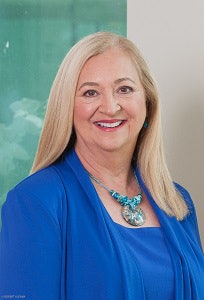What excites Dr. Cindy L. Munro about health care and the field of nursing today is not only the caliber of people who are choosing to enter health care professions, but also the shift in practitioners’ approach that emphasizes health and the prevention of problems, she says.
“An ounce of prevention has always been worth a pound of cure, and the health system is catching up to that idea!” says Munro, a renowned health care researcher, nursing leader and professor and dean of the School of Nursing and Health Studies (SONHS) at the University of Miami (UM).
Munro’s research and practice have resulted in reduced complications for intensive care unit patients and changes for the better in patient care, a legacy she is proud of. Much of this work has focused on the connections between oral health and the prevention of systemic disease.
A glimpse of the more than 150 publications Munro has authored or co-authored reveals her authority in a range of areas such as the optimal frequency of toothbrushing in mechanically ventilated adults or the efficacy of using oral chlorhexidine to prevent ventilator-associated pneumonia, among other topics.
 Dr. Cindy L. Munro
Dr. Cindy L. MunroShe is currently co-editor in chief of the American Journal of Critical Care and is the recipient of the 2016 Apex Award for Publication Excellence in Editorial and Advocacy Writing, as well as the American Society of Healthcare Publication Editors’ 2016 Best Commentary Silver Award. That same year, Munro was inducted into the Sigma Theta Tau International Nursing Research Hall of Fame.
The researcher – who says she has always liked science and health care – also has three patents, including an international patent for a vaccine to prevent streptococcal endocarditis. Munro notes that she was inspired to pursue a calling to improve patients’ lives after spending a semester working with Planned Parenthood.
“The nurses and nurse practitioners there were remarkable. They were entirely patient-focused, and committed to supporting women’s health,” she says. “Seeing them work made me realize that I wanted to have the deep connection with patients and ability to impact their lives that nurses have.”
Doctoral studies at Virginia Commonwealth University (VCU) also proved transformative for Munro, who says interacting with a variety of scientists and health care professionals “stretched” the way she thought about clinical problems.
Now as SONHS dean since August 2017, she is committed to ensuring that students similarly have immersive, experiential learning opportunities. At the time of her appointment, UM president Dr. Julio Frenk said Munro’s “extensive experience” and commitment to innovation and invention aligned well with SONHS’ mission “to share health knowledge and provide service focused on patient safety to our community and communities across the globe.”
Munro and other SONHS leaders are preparing the next generation of nurses and health care professionals through new initiatives in virtual and augmented reality, rich and varied clinical experiences and global and hemispheric opportunities to learn, she says. The university is home to the National Institutes of Health-funded Center for Latino Health Research Opportunities – a center that focuses on health disparities in vulnerable Latinos/as populations – and, significantly, the Simulation Hospital.
“Our new state of the art Simulation Hospital lets our students gain skills and confidence, and is a perfect place for practicing professionals to build new skills and practice interdisciplinary teamwork,” Munro says. Moreover, students build cultural competence due to the city of Miami’s diverse communities and its location, which sits “at the crossroads of the Americas as a gateway to Latin America and the Caribbean.”
“UM SONHS has exceptional programs, and our outcomes demonstrate that!” Munro says. “We are routinely the premier Florida nursing school in NIH funding.”
Likewise, Munro has received more than $18 million in funding to support her work. She is the recipient of the 2017 Leadership in Research Award from the Southern Nursing Research Society and is a member of the National Academy of Inventors. In addition, she is a fellow with the American Academy of Nursing, the American Association of Nurse Practitioners and the American Association for the Advancement of Science.
Prior to UM, Munro served as associate dean of research and innovation at the University of South (USF) Florida College of Nursing. She joined USF from the VCU School of Nursing where she also had affiliate professor appointments in VCU’s School of Medicine.
Munro received her BSN from Millersville University of Pennsylvania, a master’s degree in medical surgical nursing from the University of Delaware, and a Ph.D. in nursing and microbiology and immunology from VCU. She also holds a postmaster’s adult nurse practitioner degree from VCU.
Assessing the health care system, Munro points out that nurses and nurse practitioners should have full practice authority and be able to use all of their knowledge and skills to help their patients, she says. Going forward, she will continue to inspire her students and colleagues to be innovative in their practice.
“To the extent that I have been able to support and encourage their creativity,” Munro says, “the success of my students and my colleagues is the best legacy I can have.”
Tiffany Pennamon can be reached at tpennamon@diverseeducation.com. You can follow her on Twitter @tiffanypennamon
This article appeared in the February 21, 2019 edition of Diverse.















